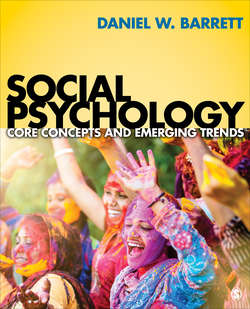Читать книгу Social Psychology - Daniel W. Barrett - Страница 185
На сайте Литреса книга снята с продажи.
Core Concepts
ОглавлениеThe self is the psychological apparatus that gives a person the capacity to consciously think about him or herself and includes self-concept, self-esteem, the interpersonal self, and the executive self. The self-concept is composed of the characteristics that we believe we possess. Schemas are cognitive structures that organize knowledge about the world, including ourselves. Self-discrepancy theory states that we possess actual, ideal, and ought selves that vary in how different they are from each other.
Introspection or looking within is limited because we often are unaware of our mental processes, even if we know their outcomes, and also because it can change how we feel. Self-perception involves looking at ourselves the way someone else might but applies primarily to when we are uncertain about how we feel. The facial feedback hypothesis states that facial expressions and movements can alter rather than merely reflect what we feel.
Self-reports are commonly used in social psychology research but may be biased, because some people tend toward extreme responding, are more likely to agree than disagree, and/or are affected by other factors like context and question wording. Surveys are advantageous because they are relatively cheap, easy to construct, and facilitate gathering large quantities of data quickly. However, if researchers are interested uncovering cause and effect, then they should opt for controlled experimentation.
People are intrinsically motivated when they engage in the activity for its own sake but are extrinsically motivated when they do so for reasons other than for its own sake. Overjustification occurs when external rewards undermine our intrinsic motivation. Self-esteem or our evaluation of how we are doing is closely linked to the quality of our relationships with other people or the extent to which they like and accept us—which is called the sociometer hypothesis.
Strategic self-presentation can serve self-enhancement, and people differ in the extent to which they self-monitor or carefully regulate the impressions they make. Self-evaluation maintenance explains how we make comparisons only when those comparisons are likely to boost our self-esteem. Strategies that we use to self-enhance include comparing ourselves to people who are doing better or worse, making self-serving judgments, ingratiating ourselves to others, self-promotion, and self-handicapping. People often feel like others are paying more attention to them than they in fact are, that others can “see” how they feel and that they are unbiased and better than most people: They may self-handicap by creating obstacles to performing well on task.
Self-regulation is another key component of the self and may be compromised because our willpower is a limited resource and may be thwarted when people ironically end up doing the opposite of what they intended.
Test your understanding of chapter content. Take the practice quiz. edge.sagepub.com/barrett
